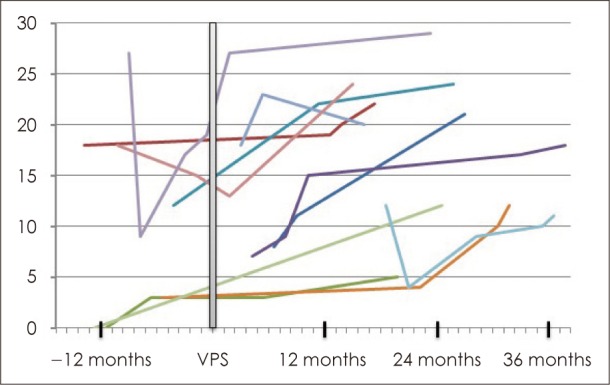Korean J Neurotrauma.
2015 Apr;11(1):6-10. 10.13004/kjnt.2015.11.1.6.
Serial Mini-Mental Status Examination to Evaluate Cognitive Outcome in Patients with Traumatic Brain Injury
- Affiliations
-
- 1Department of Neurosurgery, Konkuk University Medical Center, Seoul, Korea. his4u2@hanmail.net
- KMID: 2156085
- DOI: http://doi.org/10.13004/kjnt.2015.11.1.6
Abstract
OBJECTIVE
This study was aimed at finding out the changes in cognitive dysfunction in patients with traumatic brain injury (TBI) and investigating the factors limiting their cognitive improvement.
METHODS
Between January 2010 and March 2014, 33 patients with TBI participated in serial mini-mental status examination (MMSE). Their cognitive functions were statistically analyzed to clarify their relationship with different TBI status. Patients who developed hydrocephalus were separately analyzed in regards to their cognitive function depending on the placement of ventriculoperitoneal shunt (VPS).
RESULTS
Bi-frontal lobe injury (beta=-10.441, p<0.001), contre-coup injury (beta=-6.592, p=0.007), severe parenchymal injury (beta=-7.210, p=0.012), temporal lobe injury (beta=-5.524, p=0.027), and dominant hemisphere injury (beta=-5.388, p=0.037) significantly lowered the final MMSE scores. The risk of down-grade in the prognosis was higher in severe parenchymal injury [odds ratio (OR)=13.41, 95% confidence interval (CI)=1.31-136.78], temporal lobe injury (OR=12.3, 95% CI=2.07-73.08), dominant hemisphere injury (OR=8.19, 95% CI=1.43-46.78), and bi-frontal lobe injury (OR=7.52, 95% CI=1.31-43.11). In the 11 post-traumatic hydrocephalus patients who underwent VPS, the final MMSE scores (17.7+/-6.8) substantially increased from the initial MMSE scores (11.2+/-8.6).
CONCLUSION
Presence of bi-frontal lobe injury, temporal lobe injury, dominant hemisphere injury, and contre-coup injury and severe parenchymal injury adversely influenced the final MMSE scores. They can be concluded to be poor prognostic factors in terms of cognitive function in TBI patients. Development of hydrocephalus aggravates cognitive impairment with unpredictable time of onset. Thus, close observation and routine image follow-up are mandatory for early detection and surgical intervention for hydrocephalus.
Keyword
MeSH Terms
Figure
Reference
-
1. de Guise E, Leblanc J, Champoux MC, Couturier C, Alturki AY, Lamoureux J, et al. The mini-mental state examination and the Montreal Cognitive Assessment after traumatic brain injury: an early predictive study. Brain Inj. 2013; 27:1428–1434. PMID: 24102622.
Article2. Drew LB, Drew WE. The contrecoup-coup phenomenon: a new understanding of the mechanism of closed head injury. Neurocrit Care. 2004; 1:385–390. PMID: 16174940.
Article3. Gershberg FB, Shimamura AP. Impaired use of organizational strategies in free recall following frontal lobe damage. Neuropsychologia. 1995; 33:1305–1333. PMID: 8552230.
Article4. Lah S, Miller L. Effects of temporal lobe lesions on retrograde memory: a critical review. Neuropsychol Rev. 2008; 18:24–52. PMID: 18392939.
Article5. Lopez MN, Charter RA, Mostafavi B, Nibut LP, Smith WE. Psychometric properties of the Folstein Mini-Mental State Examination. Assessment. 2005; 12:137–144. PMID: 15914716.
Article6. Shallice T, Burgess PW. Deficits in strategy application following frontal lobe damage in man. Brain. 1991; 114(Pt 2):727–741. PMID: 2043945.
Article7. Squire LR, Stark CE, Clark RE. The medial temporal lobe. Annu Rev Neurosci. 2004; 27:279–306. PMID: 15217334.
Article8. Tritthart H. Ventricular enlargement after TBI-shunt or no shunt. In : Kanno T, Kato Y, editors. Minimally Invasive Neurosurgery and Multidisciplinary Neurotraumatology. Tokyo: Springer;2006. p. 251–256.
- Full Text Links
- Actions
-
Cited
- CITED
-
- Close
- Share
- Similar articles
-
- Comparison of Sensitivity of Neurobehavioral Cognitive Status Examination and Mini-mental State Examination
- The Relationship of MMSE to Functional Improvement in Brain Injured Patients
- Global Synchronization Index as an Indicator for Tracking Cognitive Function Changes in a Traumatic Brain Injury Patient: A Case Report
- Traumatic Brain injury and Sleep Disorder
- Cognitive Assessment in Traumatic Brain Injury


